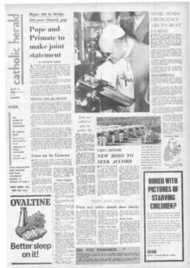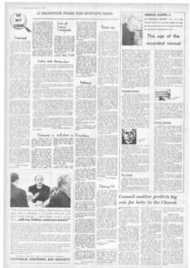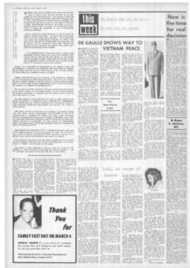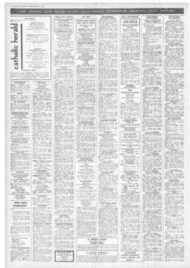Page 5, 4th March 1966
Page 5

Report an error
Noticed an error on this page?If you've noticed an error in this article please click here to report it.
Tags
Share
Related articles
Filling Academic Posts Of Charles Davis
A Response From A Dominican
'objections To Roman Catholicism'
In The Catholic Herald Of March 4, Fr. Charles Davis
The Davis Crash Victims
The Future of Catholic Christianity
FR.
CHARLES
DAVIS
The book Objections to Roman Catholicism, which Fr. Charles Davis reviewed in these pages 18 months ago, became a world bestseller. Next Monday, a new book which can be regarded as its sequel will be published by Constable. It is The Future of Catholic Christianity, edited with an Introduction by Michael del la Bedoyere (price 21s.).
Ten writers deal with some of the aspects of the Faith which are most discussed among Christians today. Their contributions are outspoken. So, too, is this review by Fr. Davis who bluntly declares that instead of providing sound guidance, the book "far from being helpful . is disastrous".
As Newman, the theologian of doctrinal development, so clearly saw, the dogmatic principle is funda mental to Catholic Christianity. The Catholic faith is still what historical Christianity was from its beginning: a dogmatic faith. A dogma is a final and absolute decision in a question concerning the faith. The Church answers a question about revelation with an explicit and irrevocable statement.
The dogma is always the answer to a particular question and therefore always only a limited truth, Other truths will always complement it, and dogmatic teaching never comes near to exhaustively expressing revelation. Moreover a dogma is inevitably formulated in human concepts and language. These are imperfect and subject to change. They formulate an understanding, always imperfect, of revealed truth. When the understanding grows, they change. But the new formulation will not contradict the old, any more than a first, genuine insight is invalidated by a second, fuller insight. A dogmatic affirmation is irreversible, even when better formulated or taken up into a fuller statement.
THE DOGMATIC PRINCIPLE is not the enemy of religious experience. A dogma usually comes out of a long history of Christian experience, and its function is to keep that experience in touch with the mysterious reality mediated to men through the Christian message. It serves to prevent the distortion and destruction of Christian experience. To oppose the dogmatic principle to Christian experience is to misunderstand both.
The mention of dogmas today causes distrust, indeed aversion. There are several reasons for this. The general intellectual situation is inimical to any claim to objective truth other than empirical. Within the Church we are suffering from the boomerang effect of an exaggerated and excessively rigid interpretation of the dogmatic principle. Too much stress was laid on dogmas in relation to other factors in Christian experience. The bearing of past dogmatic affirmations was broadened in an unhistorical fashion, and insufficient attention was given to the changing elements in which they were embedded. Statements that were never dogmas were treated for all practical purposes as if they were. The result was only to be expected. People were made incapable of assimilating the changes now taking place. For too many the changes can be interpreted only as the abandonment of thedogmatic principle. Hence their bewilderment. Their concern is correct to this extent: the abandonment of the dogmatic principle is the denial of Catholic Christianity. It is their interpretation of the facts that is wrong.
IT WAS REASONABLE to hope that a book on The Future of Catholic Christianity, which devotes much of its space to the problem of faith, would provide some sound guidance in this difficult situation. It does not. Far from being helpful, it is disastrous. Of the ten essays in this book, edited with an introduction by Michael de la Bedoyere, the one which by its length and forceful writing conveys the dominant impact is a plain denial of orthodox Christianity in its totality as a dogmatic faith. I refer to the essay "The Broken Pitcher" by Magdalen Goffin. The author writes with admirable lucidity. There is no mistaking her meaning. Her essay is a powerful attack on the dogmatic principle and a rejection of any definite revelation of doctrinal truth. The "Roman Catholic Church finds herself today in a state of confusion, disarray, and doctrinal chaos unparalleled in her history". She is paying the price of living in a fool's paradise. She now has "to repudiate some of her basic thinking and so cease to be her historic self". And with her will go "the tottering superstructure of Christianity". Understandably enough, appeal is made from dogma ter religious experience, the communion of the soul with God. The remaining function of the Roman Catholic Church would seem to be to serve as "the one community of sufficient strength, vitality, and spiritual genius" to lead the spiritual renewal that will answer the world's despair.
NO SUMMARY can do justice to 54 pages of most effective writing. It is remarkably able repudiation of the historical Christian faith. A future for Catholic Christianity? Catholic Christianity in any customary sense of the term is, if the author is to be believed, an illusion. However, a great in tellectual weakness of her essay is to connect her conclusions with the Second Vatican Council. This is a blatant piece of self-deception. It is pretty obvious that her conclusions were reached quite independently of the Council by a.personal process of development. Her interpretation is imposed upon the Council against all the available evidence, of which she makes no serious use. The confusion caused by the Council in the minds of the badly instructed should not be identified with the Council itself.
THE CLARITY of Mrs. Goffin's essay will, I think, have the effect on most readers of subordinating to her thesis two weaker essays on the same theme of faith. The opening essay by Yvonne Lubbock, "Belief is Being", begins promisingly enough with remarks on the relation between individual spiritual experience and the body of doctrines in
institutional Christianity. Some good points are made. But then the author gets bogged down in difficulties over infallibility. This is not surprising. There are difficulties. The essay, however, peters out without any very clear conclusion. This will be provided by the blunter treatment of Mrs. Goffin. Likewise, the long essay by Mr. E. I. Watkin, "The Wisdom of the Spirit", will leave the average reader somewhat puzzled. It is on religious experience and in another context would probably be appreciated for its positive content without too much attention being paid to its negative remarks. But this is what the reader meets in the second paragraph: "In this theological eruption many pronouncements concerning dogma and morals deemed hitherto immutable, because divinely
guaranteed, are being exploded. The elaborate structure of theological and moral doctrine crumbles before our eyes." He will want to know the full implications of this and not finding them worked out with sufficient clarity in Mr. Watkin's idiosyncratic essay on the letter and the spirit will incorporate the insights he gleans from it into the general scheme Mr. Watkin's daughter, Mrs. Goffin, so unambiguously outlines.
MR. WATKIN is not enthusiastic about the present. He deplores the wanton destruction of the liturgy brought about by the recent changes. His preference is for ' the baroque glories of the Tridentine era. But he has great hopes for the future. He expects a Third Kingdom of the Spirit, which will succeed the Catholic Church as that Church succeeded the Synagogue. Since, as he tells us, he has held this conviction for the past 50 years, his peculiar anticipation, like his daughter's personal religion, has nothing to do with the Second Vatican Council, and little to do for that matter with the Catholic faith.
THERE ARE SEVEN other essays in the boisk. It would be unjust to overlook them, though the book as a whole is unredeemable. The denial of Catholic Christianity in its historically identifiable form and the expectation of its replacement by a Third Kingdom of the Spirit constitute an unfavourable context for calmly considering its future prospects in the light of the Council.
Two very good essays do fulfil the promise implicit in the book's title. Mr. Daniel Callahan writes on "Liberal Catholicism in America". It is excellently done. He sketches the historical background, analyses the present situation and soberly discusses the hopes and fears for the future. With delicate but sincere frankness, he indicates the likelihood of a doctrinal crisis. Though it has not yet come into the open, there is a questioning of basic doctrines by some liberals. This will eventually lead to open conflict. I think it is a good thing to assess the underlying tensions in this honest way. It is done with a sense of the difficulties involved and makes a helpful discussion of these a possibility. The other essay I had in mind is Mr. T. L. Westow's "The Heart of Unity". This is refreshing in its breadth of outlook. The author draws our attention to the wider problem of the unity of mankind and shows how the brotherhood of men can and should be operative on the ordinary human level of lay experience. I had the feeling that his description of the future shape of the Church was somewhat too imaginative, but the general spirit of the essay warmed my heart.
MR. RONALD BRECH presents a solid piece of work in his "Economic Planning for the Church". It shows the author's expert competence, but without his fault and because of lack of available information suffers from not being closely enough linked to the present facts of Church or ganisation if "organisation" is the right word for the present state of affairs. Suggestions that were less ambitious but for immediately practicable improvements would have been more useful.
AN OBSESSION with Bishops prevents Mr. Andrew Boyle's essay "Towards a New Integrity" from being very helpful. I do not want in the least to minimise the importance of episcopal leadership for the Church at large. But should the educated minority of the laity remain so dependent? We are told dramatically: "The Bishops in question seem to have forgotten a further factor. There exists in Britain, the United States and Western Europe a strong minority of Catholics willing and, able to think for themselves. Arc the patience and divided loyalties of these men and women to be stretched to breaking point? Must they become the victims of heedless complacency on high?" But if they can think for themselves, why the drama I of divided loyalties? They
should know that the Church is not the exclusive possession of the Bishops; the laity themselves are the Church. Surely, they ought to be able to place local episcopal obtuseness against its historical background and in its limited geographical setting. 'Freedom for those who can truly think for themselves is fundamentally a personal problem. They have to gain an interior freedom, which is not an easy task, and learn to exercise their freedom with tranquillity and courage. There is no need to keep making a fuss about it. A constant railing against authority is simply a sign of the insecurity and inhibitions which still beset people and prevent them from reaching a personal freedom.
MR. JOHN M. TODD is, I think, defeated by the difficulty of his subject, "Love and Morals". A much deeper intellectual analysis is required if we are going to emerge from the present confusion about the nature of Christian moral teaching. Archbishop Roberts returns to the question of conscience in a more biting essay than usual, "Quaker Marriage". Finally, there is an essay by Mrs. Bernadine Bishop on "The Future of the Female" which confirms all the worst fears aroused by the title and is yet another addition to an already extensive mythology.
Despite its good patches, the book remains a deplorable publication. Here is a formula that corresponds to a need. In the wake of Objections to Roman Catholicism, it will attract many readers, because they are seeking something that speaks to their hesitations and uncertainties. They could have been helped by a frank discussion of doubts and difficulties— yes, by all means, frank beyond the point previously considered acceptable—but supplemented with some serious reflection on what the Council had actually said and done. Instead, they are given a work that in its main impact is thoroughly destructive of the Catholic faith, because the editor apparently cannot discriminate between a searching within Catholic Christianity and a conviction that, however sincerely held, is its plain denial. I wish, too, he would awake from the illusion that the Council has underwritten any bright idea with a liberal colouring that he or his friends happen to have. The Council texts, though not perfect, nor the last word, do call for some attention.
blog comments powered by Disqus











